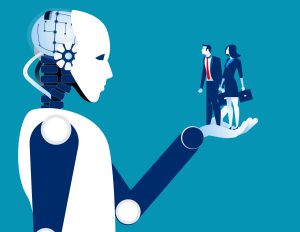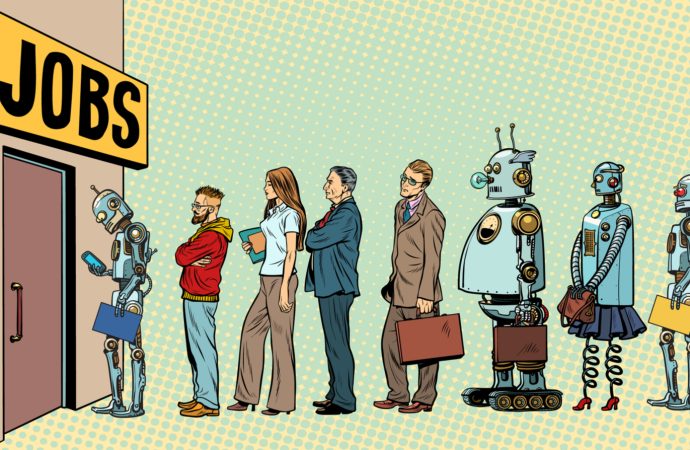As an AI researcher and technology enthusiast, I have closely observed the transformative effects of artificial intelligence on job markets. This article delves into the impact of AI on job markets, highlighting the creation of new opportunities, the reshaping of existing roles, and the challenges and considerations that come with this technological revolution. 1. Understanding
As an AI researcher and technology enthusiast, I have closely observed the transformative effects of artificial intelligence on job markets. This article delves into the impact of AI on job markets, highlighting the creation of new opportunities, the reshaping of existing roles, and the challenges and considerations that come with this technological revolution.
1. Understanding AI and Its Capabilities

Image by : Yandex
Define artificial intelligence (AI) and its core capabilities. Discuss the various types of AI, including machine learning, natural language processing, and robotics, and how they are being applied across different industries.
2. Job Creation in Emerging Fields
Examine how AI is creating jobs in emerging fields. Highlight roles such as data scientists, AI specialists, and machine learning engineers. Discuss the demand for skills in AI development, maintenance, and optimization, and the rise of new job sectors driven by AI advancements.
3. Automation and Its Impact on Traditional Jobs
Analyze the impact of automation on traditional jobs. Discuss how AI-driven automation is changing industries such as manufacturing, retail, and logistics. Explore the potential for job displacement and the need for reskilling and upskilling the workforce to adapt to new roles.
4. Enhancing Productivity and Efficiency
Explore how AI enhances productivity and efficiency in various sectors. Discuss examples such as AI in healthcare improving diagnostic accuracy, AI in finance streamlining fraud detection, and AI in customer service providing instant support through chatbots.
5. Transforming the Nature of Work
Examine how AI is transforming the nature of work. Discuss the shift towards more analytical and creative roles that require human-AI collaboration. Highlight the importance of soft skills, such as critical thinking and emotional intelligence, in an AI-driven job market.
6. The Gig Economy and Remote Work
Discuss the rise of the gig economy and remote work enabled by AI. Explore how AI platforms are connecting freelancers with job opportunities and how remote work technologies are reshaping traditional employment models.
7. Ethical and Social Considerations
Identify the ethical and social considerations associated with AI in job markets. Discuss issues such as job displacement, income inequality, and the digital divide. Highlight the importance of developing ethical AI policies and ensuring inclusive access to AI benefits.
8. The Role of Education and Training

Image by : Yandex
Examine the role of education and training in preparing the workforce for AI. Discuss the need for updated curricula that include AI and digital skills, as well as continuous learning opportunities to keep pace with technological advancements.
9. Government and Policy Responses
Analyze the role of government and policy responses in managing the impact of AI on job markets. Discuss initiatives such as funding for AI research, support for workforce development programs, and policies to promote fair and ethical AI use.
10. Future Directions: Embracing an AI-Driven Job Market
Conclude with a forward-looking perspective on the future of AI in job markets. Discuss potential advancements, emerging trends, and the long-term impact of AI on employment. Emphasize the importance of adaptability, continuous learning, and collaboration in navigating the AI-driven future.
Informative Table: Key Roles in an AI-Driven Job Market
| Role | Description | Examples |
| Data Scientist | Analyzes and interprets complex data to inform decisions | Data analysis, machine learning |
| AI Specialist | Develops and implements AI systems | Natural language processing, computer vision |
| Machine Learning Engineer | Designs and builds machine learning models | Predictive analytics, automation |
| AI Ethics Officer | Ensures ethical standards in AI development | Fairness, transparency, accountability |
| Robotics Technician | Maintains and repairs AI-powered robotic systems | Industrial robots, automated machinery |
Comparative Table: Benefits vs. Challenges of AI in Job Markets
| Benefit | Challenge | Impact |
| Job Creation in New Fields | Job Displacement in Traditional Roles | New opportunities, need for reskilling |
| Enhanced Productivity | Income Inequality | Increased efficiency, potential economic disparity |
| Improved Work Quality | Digital Divide | Better work outcomes, access to technology issues |
| Support for Remote Work | Ethical Concerns | Flexible work arrangements, need for ethical AI |
Navigating the AI-Driven Job Market
Artificial intelligence is reshaping job markets by creating new opportunities, transforming existing roles, and enhancing productivity. While AI brings significant benefits, it also poses challenges such as job displacement and income inequality. Addressing these challenges requires a collaborative effort from businesses, governments, and educational institutions to ensure a fair and inclusive transition to an AI-driven job market. By embracing adaptability, continuous learning, and ethical considerations, we can navigate the future of work and harness the full potential of AI to improve our lives and economies.
















